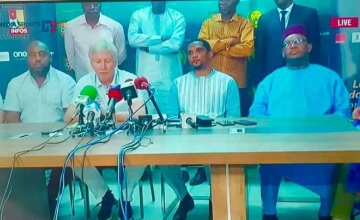
In a press release published in Brussels on February 17, 2021, the commission issued a warning (so-called yellow card) to Cameroon that it should step up its actions against illegal, unreported, and unregulated fishing.
“The Commission decision is based on identified shortcomings in Cameroon's ability to comply with agreed standards under international law of the sea as flag, port and market state,” the press release read in part.
In particular, the Commission said Cameroon should develop a robust registration policy for fishing vessels entitled to operate under its flag and should ensure efficient and adequate control overfishing activities carried out by vessels flying its flag. Weak flag state control is one of the major causes of illegal fishing in an international context.
Commissioner for Environment, Oceans, and Fisheries Virginijus Sinkevičius said: “Illegal, unreported and unregulated fishing is one of the most serious threats to the sustainable exploitation of the sea representing a major hazard to the marine environment, the sustainability of fish stocks and marine biodiversity. It is unfortunate that Cameroon has not been able to ensure proper control of fishing activities happening under its flag. The Commission stands ready to work and cooperate with Cameroon to implement the necessary reforms.”
The Brussels-based Commission encouraged Cameroon to take the necessary actions in order to abide by its international obligations in the fight against illegal, unreported and unregulated fishing.
“The yellow card is a warning and offers Cameroon the possibility to react and take measures to rectify the situation within a reasonable time. However, in cases of prolonged and continued non-compliance, countries can ultimately face a procedure of identification (a so-called red card), which entails sanctions, including on trade of fisheries products with this country,” the Commission said.
It furthered that illegal, unreported and unregulated fishing is jeopardising the very foundation of the Common Fisheries Policy (CFP) and the EU's international efforts to promote better ocean governance.
Under the European Green Deal and pursuing the United Nations Sustainable Development Goal for conservation and sustainable use of the oceans, sea and marine resources, the Commission says it has committed to a zero-tolerance approach to IUU fishing.
The fight against illegal, unreported and unregulated fishing is also an important aspect of the EU Biodiversity Strategy's objective to protect the marine environment.
It should be noted that the EU is the world's biggest importer of fisheries products. Fighting illegal fishing is part of the EU's commitment to ensure sustainable use of the sea and its resources, under the Common Fisheries Policy and under its ambition to install better international governance of our oceans. The global value of IUU fishing is estimated at 10-20 billion euros per year. Between 11 and 26 million tonnes of fish are caught illegally every year, corresponding to at least 15% of world catches.
Last week’s Commission decision is based on the EU's IUU Regulation', which entered into force in 2010. This key instrument in the fight against IUU fishing is the catch certification scheme that ensures that only legally caught fisheries products can access the EU market. The Regulation also provides for specific dialogue mechanisms with the countries that are not complying with their obligations as flag, coastal, port and market State under international law. While failure to cooperate in the framework of the dialogue can lead to an import ban for fisheries products (a so-called “red card”), the IUU dialogues are based on cooperation and support and are an important step in tackling IUU fishing, with trade prohibition only a last resort measure.














